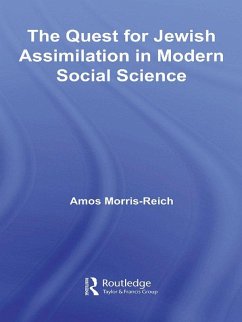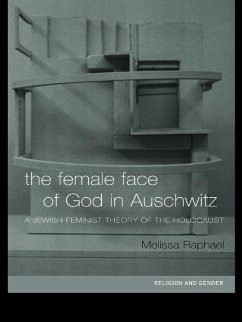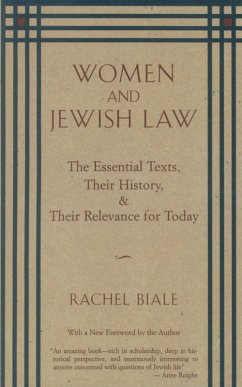
Gender and Assimilation in Modern Jewish History (eBook, ePUB)
The Roles and Representation of Women

PAYBACK Punkte
9 °P sammeln!
Paula Hyman broadens and revises earlier analyses of Jewish assimilation, which depicted the Jews as though they were all men, by focusing on women and the domestic as well as the public realms. Surveying Jewish accommodations to new conditions in Europe and the United States in the years between 1850 and 1950, she retrieves the experience of women as reflected in their writings--memoirs, newspaper and journal articles, and texts of speeches--and finds that Jewish women's patterns of assimilation differed from men's and that an examination of those differences exposes the tensions inherent in ...
Paula Hyman broadens and revises earlier analyses of Jewish assimilation, which depicted the Jews as though they were all men, by focusing on women and the domestic as well as the public realms. Surveying Jewish accommodations to new conditions in Europe and the United States in the years between 1850 and 1950, she retrieves the experience of women as reflected in their writings--memoirs, newspaper and journal articles, and texts of speeches--and finds that Jewish women's patterns of assimilation differed from men's and that an examination of those differences exposes the tensions inherent in the project of Jewish assimilation.
Patterns of assimilation varied not only between men and women but also according to geographical locale and social class. Germany, France, England, and the United States offered some degree of civic equality to their Jewish populations, and by the last third of the nineteenth century, their relatively small Jewish communities were generally defined by their middle-class characteristics. In contrast, the eastern European nations contained relatively large and overwhelmingly non-middle-class Jewish population. Hyman considers how these differences between East and West influenced gender norms, which in turn shaped Jewish women's responses to the changing conditions of the modern world, and how they merged in the large communities of eastern European Jewish immigrants in the United States.
The book concludes with an exploration of the sexual politics of Jewish identity. Hyman argues that the frustration of Jewish men at their feminization in societies in which they had achieved political equality and economic success was manifested in their criticism of, and distancing from, Jewish women.
The book integrates a wide range of primary and secondary sources to incorporate Jewish women's history into one of the salient themes in modern Jewish history, that of assimilation. The book is addressed to a wide audience: those with an interest in modern Jewish history, in women's history, and in ethnic studies and all who are concerned with the experience and identity of Jews in the modern world.
Patterns of assimilation varied not only between men and women but also according to geographical locale and social class. Germany, France, England, and the United States offered some degree of civic equality to their Jewish populations, and by the last third of the nineteenth century, their relatively small Jewish communities were generally defined by their middle-class characteristics. In contrast, the eastern European nations contained relatively large and overwhelmingly non-middle-class Jewish population. Hyman considers how these differences between East and West influenced gender norms, which in turn shaped Jewish women's responses to the changing conditions of the modern world, and how they merged in the large communities of eastern European Jewish immigrants in the United States.
The book concludes with an exploration of the sexual politics of Jewish identity. Hyman argues that the frustration of Jewish men at their feminization in societies in which they had achieved political equality and economic success was manifested in their criticism of, and distancing from, Jewish women.
The book integrates a wide range of primary and secondary sources to incorporate Jewish women's history into one of the salient themes in modern Jewish history, that of assimilation. The book is addressed to a wide audience: those with an interest in modern Jewish history, in women's history, and in ethnic studies and all who are concerned with the experience and identity of Jews in the modern world.
Dieser Download kann aus rechtlichen Gründen nur mit Rechnungsadresse in A, D ausgeliefert werden.













